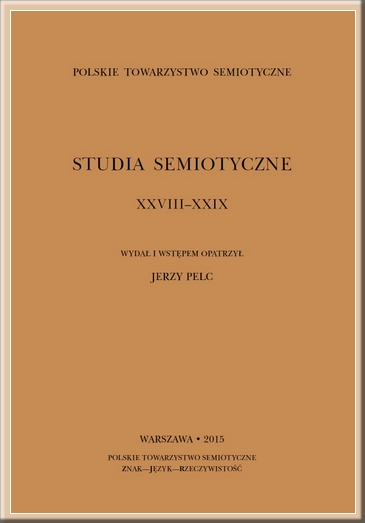Abstract
DOI: http://doi.org/10.26333/sts.xxviii.12
Celem artykułu jest wyjaśnienie relacji między znakami dyskursywnymi i inferencyjnymi procesami poznawczymi uczestników dyskursu. Innymi słowy, interesuje nas związek między publiczną sferą struktur dialogowych i prywatną sferą inferencyjnych struktur kognitywnych. W szczególności pragniemy uchwycić, w jaki sposób zdarzenia dyskursywne typu: i mówi p; potem j pyta, dlaczego p; wtedy i mówi q, stają się manifestacją i źródłem zdarzeń kognitywnych: tego, że w umyśle i zdarzyło się, a w umyśle j ma się zdarzyć inferencja: p bo q.
References
Asher Nicholas, Alex Lascarides. 2003. Logics of Conversations. Cambridge University Press.
Austin John L. 1962. How to Do Things with Words. Oxford: Clarendon.
Bach Kent, Robert M. Harnish. 1979. Linguistic Communication and Speech Acts. Cambridge, Mass.: MIT Press.
Boghossian Paul. 2012. "What is inference?" Philosophical Studies 1 (1) : 1-11
Brinton Alan. 1986. "Ethotic argument". History of Philosophy Quarterly 3 : 245–257.
Brown Donald G. 1955. "The nature of inference". Philosophical Review 64 (3) : 351–369.
Budzyńska Katarzyna. 2010. "Argumentacja jako akt mowy". Przegląd Filozoficzny – Nowa Seria 3 (75) : 339–358.
Budzyńska Katarzyna. 2010. Argument Analysis: Components of Interpersonal Argumentation. W Frontiers in Artificial Intelligence and Applications, 135–146. Amsterdam: IOS Press.
Budzyńska Katarzyna. 2012. "Circularity in ethotic structures". Synthese 190 (15) : 3185–3207.
Budzyńska Katarzyna, Chris Reed. 2011. Whence inference?. University of Dundee Technical Report.
Eemeren Frans H. van, Rob Grootendorst. 1992. Argumentation, Communication, and Fallacies. A Pragma-Dialectical Perspective. Hillsdale: Lawrence Erlbaum Associates.
Eemeren Frans H. van, Peter Houtlosser, A. Francisca Snoeck Henkemans. 2007. Argumentative Indicators in Discourse: A Pragma-Dialectical Study. Dordrecht: Springer.
Grice H. Paul. 1969. "Utterer’s Meaning and Intentions". Philosophical Review 78 :147–177.
Harel David, Dexter Kozen, Jerzy Tiuryn. 2000. Dynamic Logic. Cambridge: MIT Press.
Katzav Joel, Chris Reed. 2008. "Modelling Argument Recognition and Reconstruction". Journal of Pragmatics 40 (1) : 155–172.
Knott Alistair, Chris Mellish. 1996. "A Feature-Based Account of the Relations Signalled by Sentence and Clause Connectives". Journal of Language and Speech 39 : 143–183.
Mann William C., Sandra A. Thompson. 1988. "Rhetorical Structure Theory: Toward a Functional Theory of Text Organization". Text 8 (3) : 243–281.
Pagin Peter. 2011. "Assertion, inference and consequence". Synthese 187 : 869–885.
Prakken Henry. 2006. "Formal systems for persuasion dialogue". Knowledge Engineering Review 21 : 163–188.
Prakken Henry, Gerard Vreeswijk. 2002. Logics for defeasible argumentation. W Handbook of Philosophical Logic 4, D. Gabbay, F. Guenthner (red.), 219–318. Dordrecht: Kluwer Academic Publishers.
Reed Chris. 2006. "Representing Dialogic Argumentation". Knowledge Based Systems 19 (1) : 22–31.
Searle John R. 1969. Speech acts: An essay in the philosophy of language. Cambridge University Press.
Searle John R., Daniel Vanderveken. 1985. Foundations of Illocutionary Logic. Cambridge University Press.
Sperber Dan, Deirdre Wilson. 1986. Relevance: Communication and Cognition. Oxford: Blackwell.
Walton Douglas N. 1999. "Ethotic Arguments and Fallacies: The Credibility Function in Multi-Agent Dialogue Systems". Pragmatics and Cognition 7 : 177–203.
Walton Douglas N. 2011. "A Dialogue System Specification for Explanation". Synthese 182 (3) : 349–374.
Walton Douglas N., Erik C. W. Krabbe. 1995. Commitment in Dialogue: Basic Concepts of Interpersonal Reasoning, Series in Logic and Language. Albany: State University of New York Press.
Walton Douglas N., Chris Reed, Fabrizio Macagno. 2008. Argumentation Schemes. Cambridge University Press.


